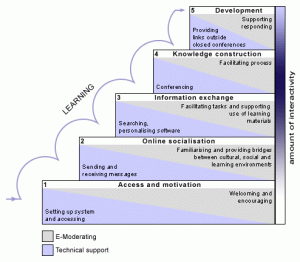 The article Facilitating Asynchronous Discussion (Bedard-Voorthees, A. “ Facilitating Asynchronous Discussion,” Encyclopedia of Distance Learning, vol. 2 (2005): 912-917) presents techniques of how online instructors can facilitate meaningful asynchronous discussions. Asynchronous refers to “one-one-one and one-to-many text based interaction independent of time.” (p.912)
The article Facilitating Asynchronous Discussion (Bedard-Voorthees, A. “ Facilitating Asynchronous Discussion,” Encyclopedia of Distance Learning, vol. 2 (2005): 912-917) presents techniques of how online instructors can facilitate meaningful asynchronous discussions. Asynchronous refers to “one-one-one and one-to-many text based interaction independent of time.” (p.912)
Competencies for asynchronous interaction (for instructors):
– scaffolding (building on prior knowledge, sequencing)
– technical support
– “online communication skills” – the ability to write clear, positive contributions in a “personable” way
– “content expertise”
– “personal characteristics”
How to create a positive atmosphere in asynchronous interaction (for instructors):
– self-disclosure (local details and humor)
– expressing interest and encouragement
– inclusiveness behaviours (responding to learners by name, using “we” instead of “I” and salutations – “Hi all”)
– control over the choice of words with negative connotations
Reasons why learners may write impertinent posts:
– lack of clarity about learning expectations
– anxiety about the new text environment
– a sense of displacement from community (due to online environment)
Side note: “students sometimes make remarks online they would never in a face-to-face classroom”
Instructional competencies (for instructors):
– ability to generate goals for discussion
– create participant expectations
– formulate stimulating questions
– re-direct strayed discussions
Content items that matter (for learners):
– addressing the topic
– reference to readings
– real-life examples
– a response to another student
– expressing own viewpoint
Side note: It’s recommended that the instructors provide “models for students as a way of suggesting appropriate levels of response”
Good questioning techniques (for instructors & learners):
– spark discussion
– re-engage participants
– prompt students to process the learning content
– respond to an expand upon the response of others
Kinds of questions:
– open-ended or naïve (e.g. What would happen if ______?)
– asking for clarification of statement
– questions that identify assumptions
– asking for example of evidence
– asking learners to consider alternatives
– asking about viewpoints
Reflections:
The article is quite useful for online learners too.
The article ends with the mention of MERLOT Virtual Speaker Bureau. MRLOT “allows you to enhance the educational experiences of your students by bringing them together with guest speakers who are experts in their fields. Guest Experts are available on a wide range of topics relevant to technology, teaching, and learning…” Bottom line, it’s just another tool useful in distance education.
